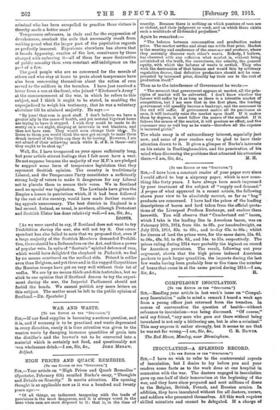HIGH PRICES AND QUACK REMEDIES. (To vas Minos or rim
"Brno-mm.1 Sin,—Your article on "High Prices and Quack Remedies" (Spectator, February 6th) recalled Burke's essay, "Thoughts and Details on Scarcity." It merits attention. His opening thought is as applicable now as it was a hundred and twenty years ago:—
" Of all things, an indiscreet tampering with the trade of provisions is the moot dangerous, and it is always worst in the time when men are most disposed to it that ie, in the time of
scarcity. Because there is nothing on which passions, of men are no violent, and their judgment so weak, and on which there exists such a multitude of ill-founded prejudices"
Again he remarked:— " The balance between consumption and production makes price. The market settles and alone can settle that price. Market is the meeting and conference of the cotsunicr and producer, where they mutually discover each other's wants. Nobody, I believe, has observed with any refiemion what mart-et ie, without being astonished at the truth, the correctness, the celerity, the general equity, with -which the balance of wants is settled. They who wish the destruction of that balance mad would fain by arbitrary regulation decree, that defective production should not be com- pensated by increased price, directly lay their are to the root of production itself."
Then as to the interference of Government he wrote:-
" The moment that government appears at market, all the prin- ciples of market will be subverted. I don't know whether the farmer will suffer by it as long as there is a tolerable market of competition, but I am sure that in the first place, the trading government will speedily become a bankrupt, and the consumer in the end will suffer. If government makes all its purchases at once, it will instantly raise the market upon itself. If it makes them by degrees, it must follow the course of the market. If it follows the course of the market, it will produce no effect, and the consumer may as well buy as he wants—therefore all the expense is incurred gratis."
The whole essay is of extraordinary interest, especially just. now, and some of your readers may be glad to have their attention drawn to it. It gives a glimpse of Burke's interests on his estate in Buckinghamshire, and the penetration of his mind when discussing the problems that attracted his attention






































 Previous page
Previous page